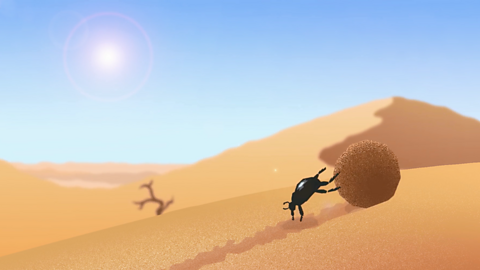Oceans of the world

There are five oceans that cover just over 70% of the planet, and they are all connected together:
- the Atlantic Ocean
- the Pacific Ocean
- the Indian Ocean
- the Southern Ocean
- the Arctic Ocean
The nearest ocean to the UK is the Atlantic Ocean. It stretches from Europe to North and South America, and is the second largest of the five oceans.

What are ocean currents?
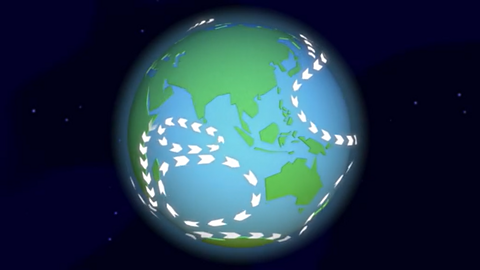
The water in the oceans is constantly moving in patterns called currents.
As the currents flow around the planet, they move cold and warm water from one place to another. This changes climate and temperatures all over the world.
The UK would be much colder if it wasn’t warmed by water that travels from the Caribbean - called the North Atlantic Drift, or the Gulf Stream.

Watch: Oceans
I love the beach, and especially rock pools!
The water swirls in from the tide, and you never know what creatures it’ll bring with it.
That great ocean out there is called the Atlantic.
It stretches all the way from Europe and Africa, right across to the Americas, and it is up to eight kilometres deep in places!
It’s one of the five oceans that cover nearly three-quarters of the Earth.
The Atlantic, Pacific, Indian, Southern and Arctic.
Although the water looks calm and still from outer space, it’s always moving in patterns called currents.
So the water that swirls around this rock pool has travelled thousands of miles across the globe and so have some of the creatures in it.
When ocean currents flow around the planet, they move warm and cold water with them, changing the climate and weather as they go.
For example, Britain would actually be much colder if it wasn’t for the warm water flowing from the Caribbean.
The currents also move anything that happens to be floating in them, which can be sea creatures, ships and unfortunately rubbish.
This rubbish is harmful for sea creatures and can be brought ashore on the tides too.
And talking of the tide…
I think it may be time to move.
What problems are oceans facing?
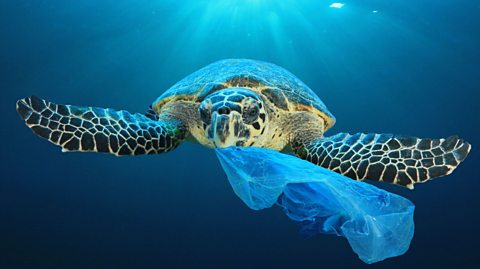
Rubbish finds its way around the world, pollutes the oceans and can be harmful to sea creatures.
Some kinds of rubbish, such as plastic, are eaten by sea creatures. This causes them lots of problems and can even kill them. It's important to look after the planet by recycling and reducing the plastics people use.
As well as the impact from plastic pollution, other threats to our oceans include over-fishing and climate change.

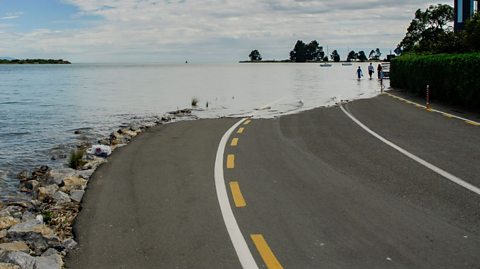
Scientists say that seas are now the warmest they have ever been in recorded human history. The cause of this temperature rise is global warming linked to human activity, such as the burning of fossil fuels.
Higher global temperatures mean that ice caps begin to melt, sea levels rise and people in low-lying coastal areas lose their homes. Marine creatures lose their homes too: some can’t adapt to the higher temperatures and ecosystems like coral reefs can become badly damaged.
Warmer oceans are also linked to changes in weather and climate patterns, such as storms, floods and drought around the world.
Activity: Quiz – Oceans
Bitesize Primary games. gameBitesize Primary games
Play fun and educational primary games in science, maths, English, history, geography, art, computing and modern languages.

More on The natural world
Find out more by working through a topic
- count7 of 16
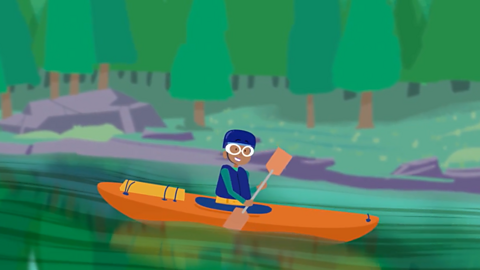
- count8 of 16
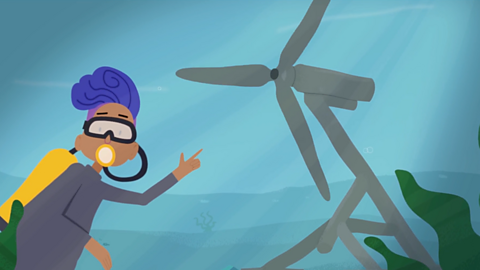
- count10 of 16
